Sep 3, 2025. Oceania Lecture Tour (5) Perth
Hello. Today marks the fifth stop of the Oceania lecture tour, where Sunim will give a Dharma Q&A for Korean expatriates in Perth.
After completing morning practice and meditation, Sunim presented his books as gifts to Jeong Eun-ji, the overseas branch director who coordinated this Oceania tour, and Choi Young-hee, the president of the Australia-Europe chapter.
After today’s lecture in Perth, Sunim was scheduled to travel to Jakarta, Indonesia for two days of lectures. However, due to recent political conflicts in Indonesia that have led to protests and violence, local authorities requested that public gatherings be avoided. As a result, the Indonesia visit was completely canceled. Because of this, Branch Director Jeong Eun-ji urgently rebooked Sunim’s flight from Perth back to Korea.
“Thank you for all your hard work.”
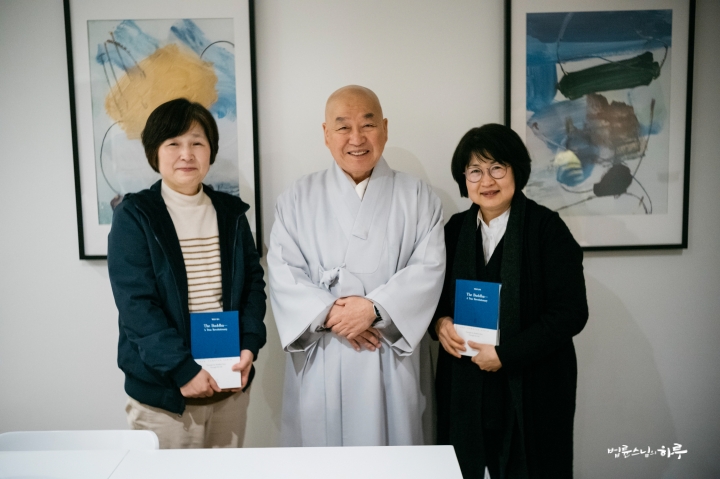
After breakfast, Sunim left the accommodation at 6:20 AM and headed to Melbourne Airport.

Arriving at the airport at 7:30 AM, Sunim exchanged farewell greetings with members who had come to see him off before heading to the departure gate.

While waiting at the gate and attending to work matters, Sunim departed Melbourne Airport at 9:05 AM. After approximately five hours of flight, he arrived at Perth Airport at 12:00 PM local time.

After collecting luggage and exiting the airport, Perth Jungto Society members were waiting to welcome Sunim.
“Welcome to Perth!”
After exchanging warm greetings and taking commemorative photos, they immediately headed to the accommodation.
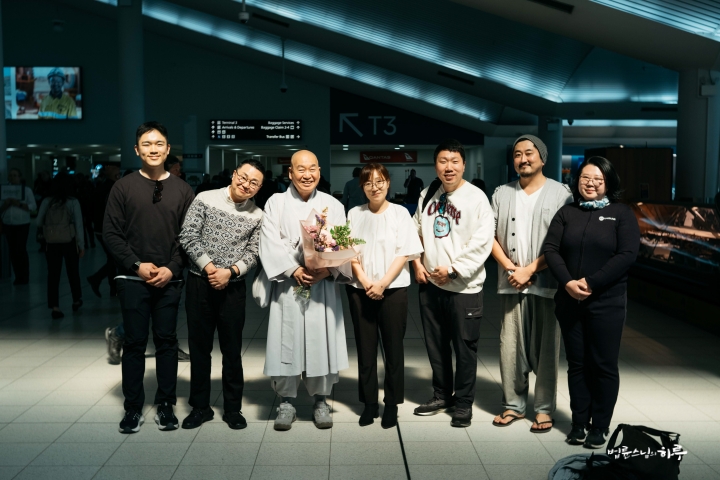
Considering Sunim’s tight schedule, the lecture preparation team had arranged accommodation near the venue. After a 20-minute drive from the airport, they arrived at the accommodation at 12:30 PM. Perth Jungto Society members who had gathered to prepare for the lecture greeted Sunim with three prostrations.
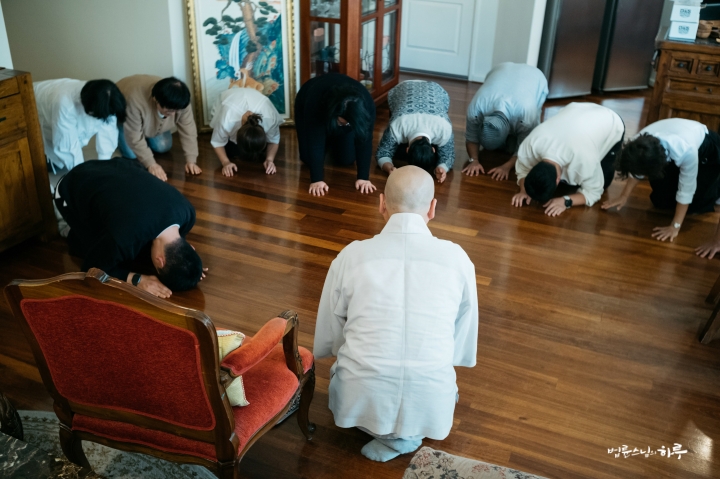
After lunch, Sunim spent the afternoon handling work matters while communicating with Korea and taking some rest. At 5:30 PM, he had dinner and headed to the lecture venue.
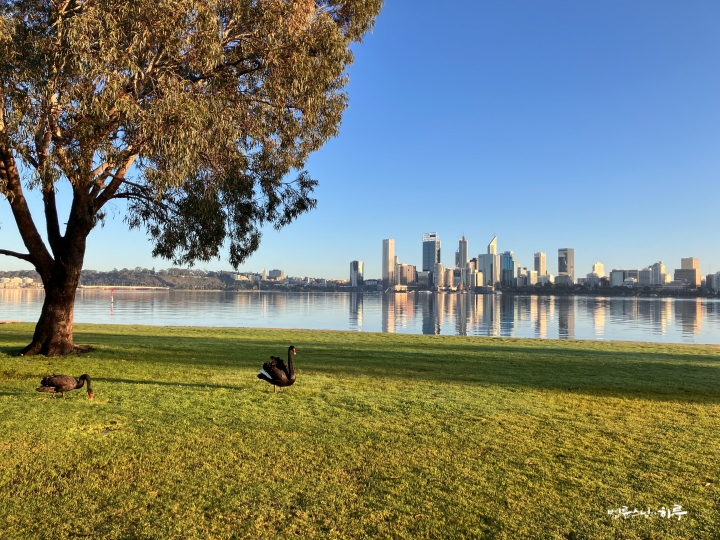
Today’s lecture was held in a classroom at Curtin University in Perth, Australia. Curtin University is a major comprehensive university representing Western Australia, serving as an educational hub with diverse academic fields and international research activities.
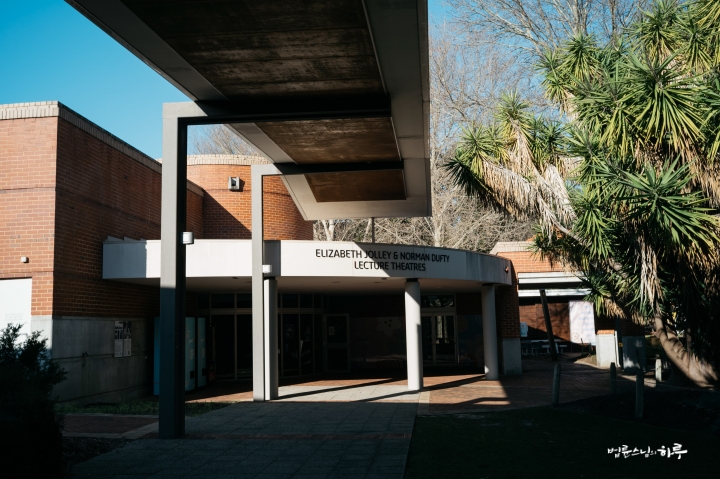
When applying to rent the lecture hall at Curtin University, the person in charge was curious about Venerable Pomnyun Sunim. After sending information about Sunim’s activities, they were so impressed that they offered the lecture hall free of charge.
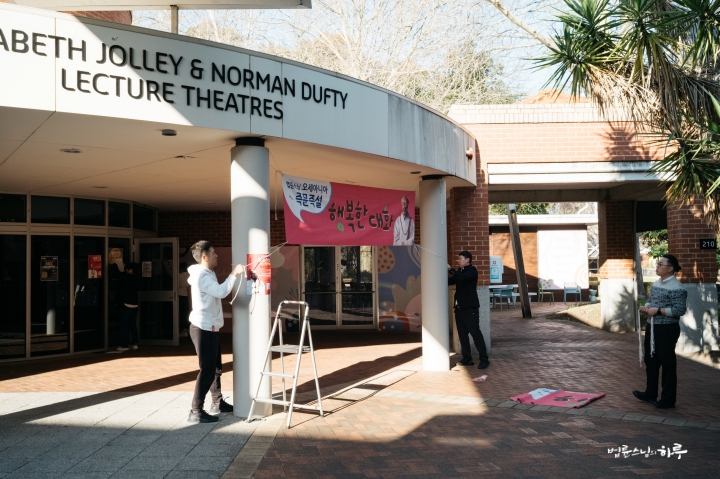
When Sunim arrived at the venue, volunteers were warmly welcoming the audience at various locations.
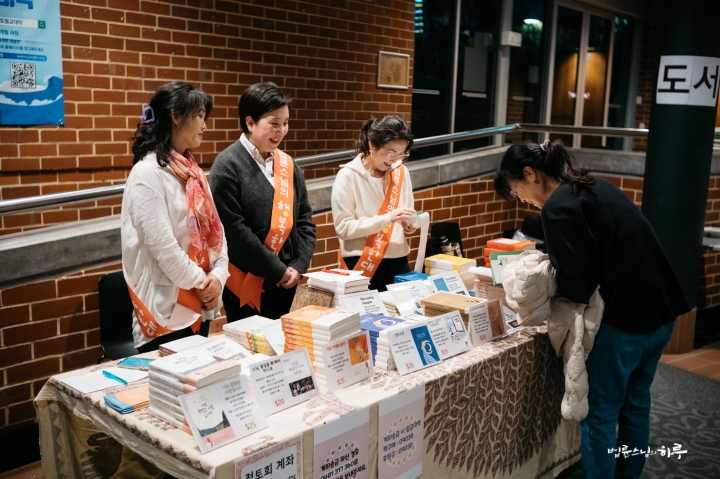
Since Sunim needed to leave for the airport immediately after the lecture, the book signing was held before the lecture. Many people lined up to receive Sunim’s autograph and express their gratitude.
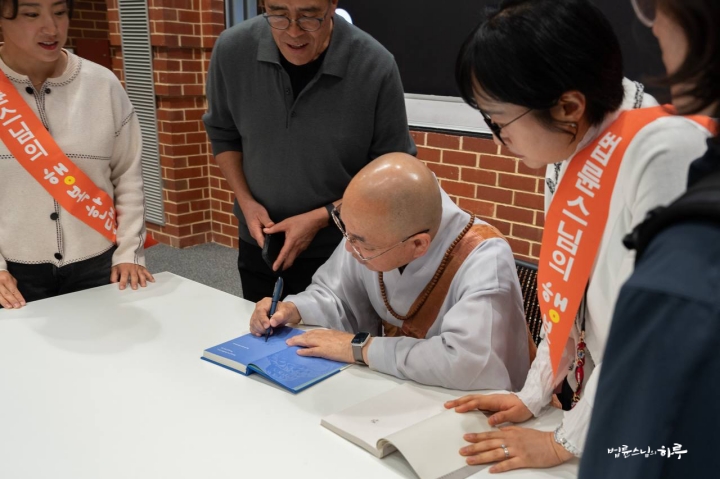
After the introductory video ended, Sunim walked onto the stage at exactly 7:00 PM. Loud applause and cheers erupted.
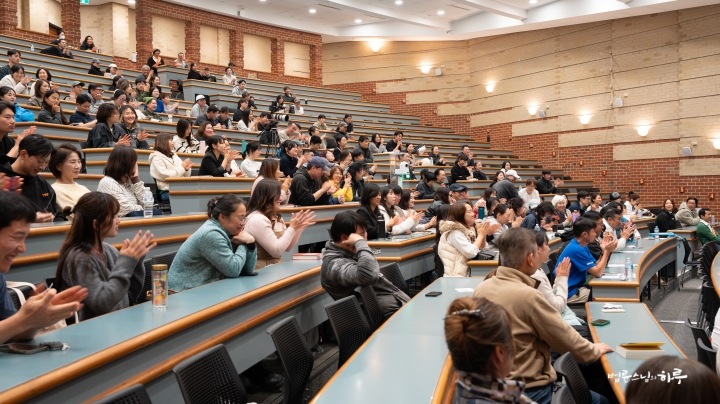
With about 240 people in attendance, Sunim began the lecture by discussing the current domestic and international situation of the Republic of Korea.
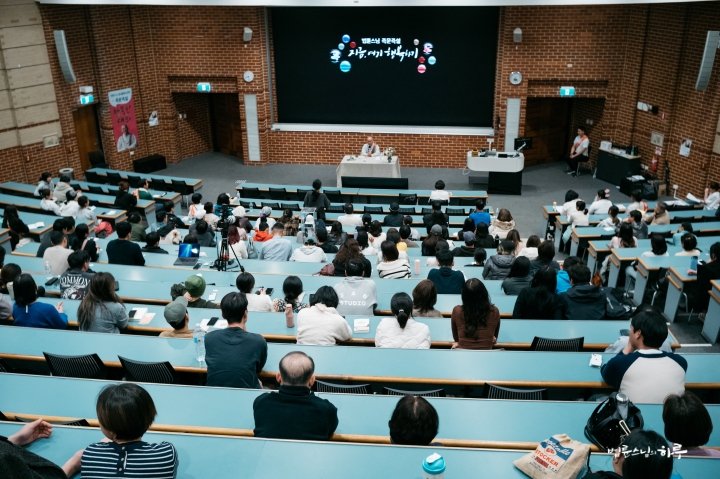
“Last December, Korea experienced significant political difficulties due to the martial law crisis. I’m sure many of you overseas were deeply concerned. Fortunately, after many twists and turns, a new government has taken office and the political situation has regained some stability.
The Republic of Korea’s Challenges Amid Inter-Korean Confrontation and International Affairs
The fact that a coup attempt occurred in a democratic country shows that Korean democracy has not yet fully taken root. Due to the divided state and confrontation between North and South Korea, things that would be unimaginable in other countries can suddenly happen in our country. Nevertheless, the fact that martial law was lifted within just a few hours paradoxically demonstrates how much democracy has taken root. In this way, Korean democracy simultaneously embodies both instability and maturity.
Above all, thanks to the support and concern sent from overseas, although it took six months to resolve, we were able to overcome this major crisis. Through this incident, we must once again realize that the North-South confrontation is not simply an international issue, but also a significant obstacle to the development of democracy in the Republic of Korea.
Another crisis was the U.S. tariff bomb. Although the response may have seemed somewhat humiliating, we succeeded in defending to some extent and avoided major danger. However, the bigger problem is that today, the leaders of North Korea, China, and Russia gathered in one place in China. If military cooperation among South Korea, the U.S., and Japan strengthens in response, the Korean Peninsula could fall back into a new Cold War tension. This is a very worrying situation. This issue is no longer just a task for politicians. It’s time for all citizens to unite their hearts and overcome this crisis together.”
Following this, those who had submitted questions in advance began their dialogue with Sunim. In the latter part of the lecture, three additional people asked questions on the spot and engaged in conversation with Sunim. Over the course of two hours, eight people were able to ask Sunim questions. One of them sought Sunim’s advice, troubled by anger that keeps erupting despite loving their child.
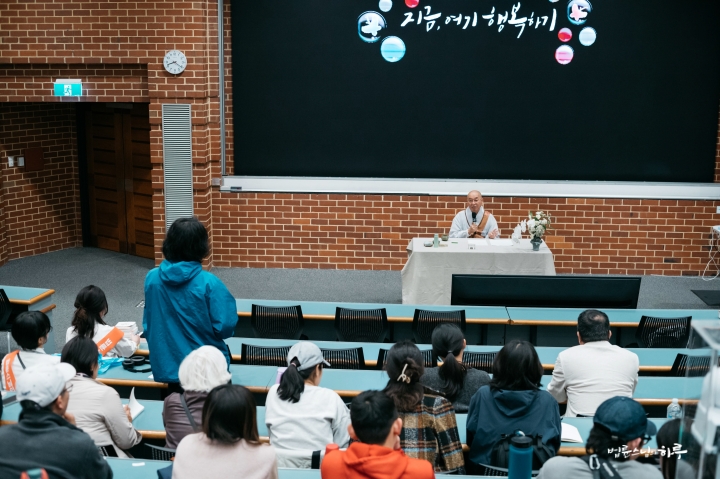
How Can I Control My Anger That Explodes Even After Holding It In?
“When you’re angry, isn’t it natural to express that anger? Just live naturally expressing your anger. (Laughter)
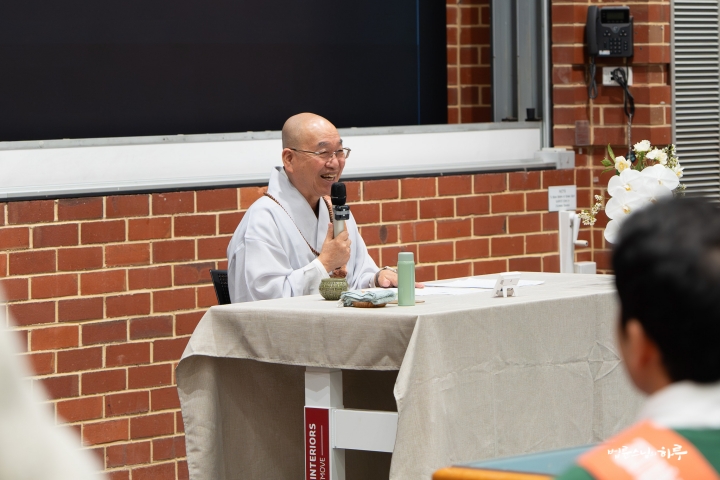
Rather, holding it in three or four times makes the explosion bigger. If you don’t hold it in and express it naturally each time you’re angry, the impact on the children will be much smaller. From today, think that it’s okay to express anger naturally when you’re angry. Don’t hold it in. Holding it in is not practice. When you hold it in, stress accumulates, and when it all explodes at once, it gives a bigger shock to others.
When anger arises, be aware that ‘anger is arising now.’ If you’ve expressed anger, be aware that ‘I’ve expressed anger.’ Also, if you’ve expressed anger, it’s necessary to repent immediately. Lightly apologize to the children, saying ‘I’m sorry for getting angry.’ When the anger is too big, even apologizing becomes embarrassing, but when you’ve just been slightly irritated, if you say ‘Oh, sorry!’ the children can laugh it off too.
When you’re angry, what’s important is not to forcibly hold it in but to be aware that ‘I’m angry now.’ This way, sometimes the anger doesn’t come out, and even if it does, you can apologize right away. If the children say ‘Mom, why do you get angry when you’re going to apologize anyway?’ you can lightly respond with ‘Well, wouldn’t that be nice?’ If they ask ‘Can we get angry too?’ you can say with a smile, ‘No!’ You can explain jokingly, ‘I didn’t get angry when I was young, but now that I’m an adult, I keep getting angry. So if you start getting angry when you’re young, it’ll get worse when you grow up, so you can’t!’
Conversely, when children get angry and you ask ‘Why are you angry?’ they might answer ‘You get angry too, Mom.’ In that case, just admit it right away, saying ‘You’re right, I’m sorry.’ If you stay sulky after getting angry, it hurts people, but if you add humor after getting angry and say ‘Your mom has a bad temper,’ you can reduce the hurt. Just say with a smile, ‘Your mom has a bit of a bad temper. Sorry!’ This is enough. It’s not as good as not getting angry, but it’s a way to minimize hurt even in situations where you’ve gotten angry.
Holding it in actually increases anger, so it doesn’t help. Of course, there are times when holding it in is necessary with others. When you’re angry at work or in meetings, you just need to avoid that moment. But since you’re always with family, temporarily holding it in doesn’t solve anything. It’s bound to explode again later. So don’t try to control yourself. Controlling means holding it in. Don’t hold it in, but be aware that ‘I’m getting angry.’ If you’ve unknowingly expressed anger, just apologize immediately saying ‘Oh, I’m sorry for getting angry.’ Try practicing this first.”
“Yes, I understand well.”
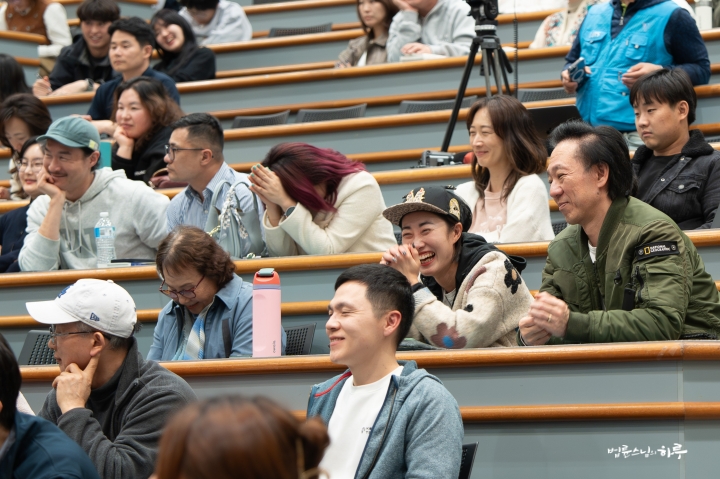
“But if you lose your temper in front of children, they’ll become similar in temperament. But that’s okay. Just as you’ve lived this way, the children will live well too. Those children will also have children someday and raise them while getting angry. That’s our human civilization. Korean people have quick tempers because their parents have quick tempers, so children naturally become quick-tempered and everyone lives in a hurry. But they still live well, don’t they? So a positive perspective is also necessary. It’s not as good as not getting angry, but getting a little angry doesn’t become a big problem in life. It’s good not to get angry, but just deciding ‘I won’t get angry!’ doesn’t solve it.
Looking a little deeper, you can see that the moment of anger is actually a state of being slightly crazy, not in your right mind. So when anger suddenly wells up, you need to be aware that ‘Ah, I’m crazy now.’ But we keep rationalizing. We rationalize thinking ‘How can I not get angry in this situation!’ That’s why it’s hard to fix. Anyone can get angry, but you need to be able to realize that being angry is actually not being in your right mind.
If a mother frequently shows anger to her children, it’s not good educationally. But you don’t need to forcibly hold it in. Holding it in becomes suppression and can explode later, potentially giving children deeper wounds.”
“Thank you. I understand well.”
Questions continued one after another.
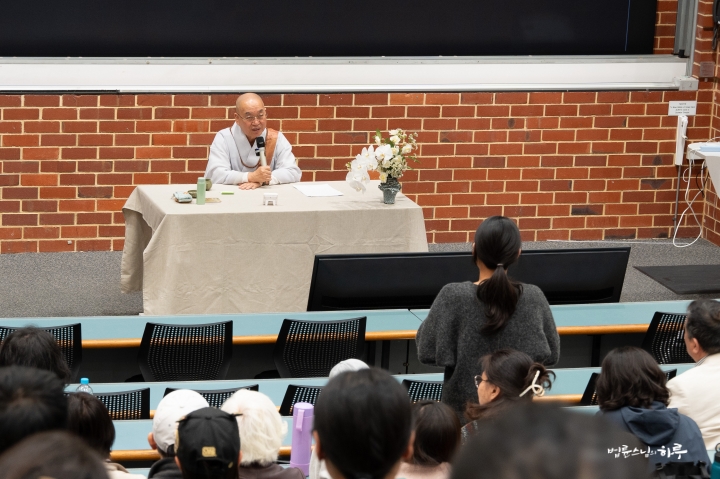
In immigrant society, there are many relationships formed through affection among Koreans, but we also get hurt or scammed. How should we overcome conflicts in such situations?
When I’m depressed, others also look depressed to me. Is this an illusion? Also, it’s difficult to grasp the emotions of people around me. Is there a way to know others’ minds?
Innocent lives are being sacrificed for human development. What perspective should we have to solve the environmental crisis?
It’s difficult to maintain a planned life. Is there a way to set goals and steadily move toward them?
Frequent phone use causes many arguments between my spouse and me. I get angry when my wife stops me from doing what I want. Is it my fault?
Are there movements or religious organizations that can break the notions that people have?
As the lecture was coming to an end, the last questioner asked how to live the rest of life happily.
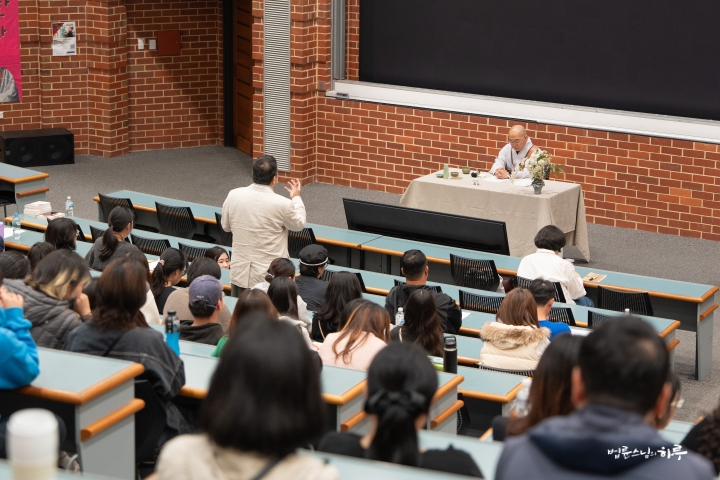
“Nobody knows whether you’ll go first or these young people here will go first. (Laughter) So there’s no need to worry about ‘preparing for death’ or ‘how can I be happy?’ Just be happy today. When you open your eyes in the morning, think ‘Oh, I’m alive!’ Just think you’re living only for today. Then there’s no reason to spend time suffering. If you open your eyes again tomorrow morning, think ‘Ah, I’m alive today too!’ and live another happy day. If you die after a year, you’ve lived for a year; if you live for 10 years, you’ve lived for 10 years; if you live for 30 years, you’ve lived for 30 years. Don’t worry about 30 years in advance, just live happily today.”
“Yes, thank you.”
After answering all questions, Sunim gave concluding remarks.
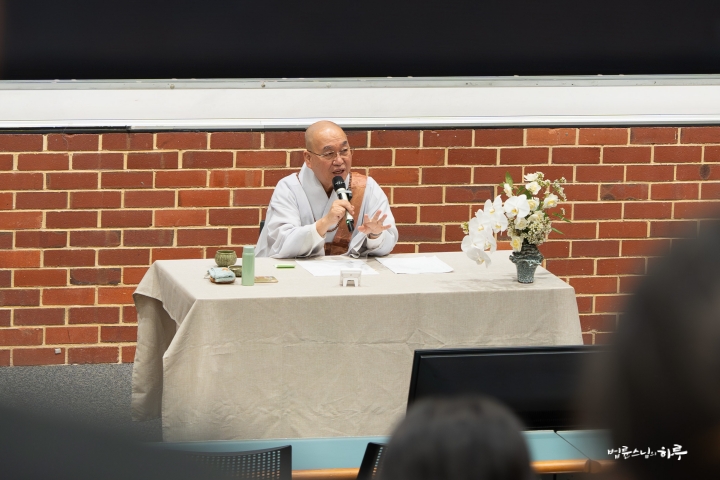
“To live life happily, it’s important to be aware of your state here and now. Then there’s nothing to suffer about. Being able to come to Australia was a good opportunity, wasn’t it? You made a better choice and came to Australia. So there’s no need to complain. If you don’t want it, you can return to where you were. Life is the same. If things don’t go as you want, try this way and that way. If it still doesn’t work, you have somewhere to return to. If two people marry and it doesn’t work out, they can divorce and live alone again. You were living well alone originally. You lived together to live better, but if it doesn’t work out, you can live alone again. There’s nothing difficult. Try as much as you can, and if it doesn’t work, return to the original state.
The Wisdom of Living Life Lightly
If it doesn’t rain, you can dig the ground to make a well, build a reservoir, or try various things. If that still doesn’t work, you can move. Will it help to just look at the sky saying ‘Rain, please rain’? It doesn’t help at all. There’s no need to cry because your visa application was rejected. You were living well in Korea without a visa originally. If you get a visa, that’s better; if not, live without it. There’s no problem with failing while pursuing something better. Because it’s not something you must do.
I help with necessary things, but I don’t actively engage in things that don’t need to be done. People need to eat to live, so I help anyone who’s starving. They need clothes and water too, so I support such basics for people in any region. But other things are optional – it’s fine if done, fine if not. Good if it works out, okay if it doesn’t. So if you have no problems with eating, clothing, and shelter, there’s no need to worry. This doesn’t mean do nothing, but do your best and if it doesn’t work out, that’s that. So what if it doesn’t work? Marriage too – no matter how hard you try, it might not happen. But you’re still the same as Venerable Pomnyun. I’m living well alone too, so why would you have any reason not to? So change your perspective a little. You need to live life lightly.
Dating is the same. No matter how much I like someone, if they don’t like me, that’s it. It doesn’t matter that I like them. If they don’t like me, I should say ‘Goodbye’ and turn away. But you all keep clinging stickily. ‘I like you, how can you do this?’ But such thoughts are meaningless. The other person has their own right to decide.
If Rabbits and Squirrels Can Live, Why Can’t I?
Life becomes much easier when you have the right perspective. Rabbits live, squirrels live – is there any reason people can’t? Nobody thinks they’re inferior to rabbits or squirrels. When you feel it’s hard, go to the forest and look at squirrels. ‘If they can live, what reason do I have not to?’ Think lightly like this.
Many young people attended today – try various things. Whether they work out or not isn’t very important. Looking back after 30 years, you’ll probably just remember ‘I had a really good time in Australia then.’ There’s nothing worth risking your life for. Looking back, nothing is a big deal. So I hope you live life lightly.”
After finishing the dialogue, it was well past 9 PM.
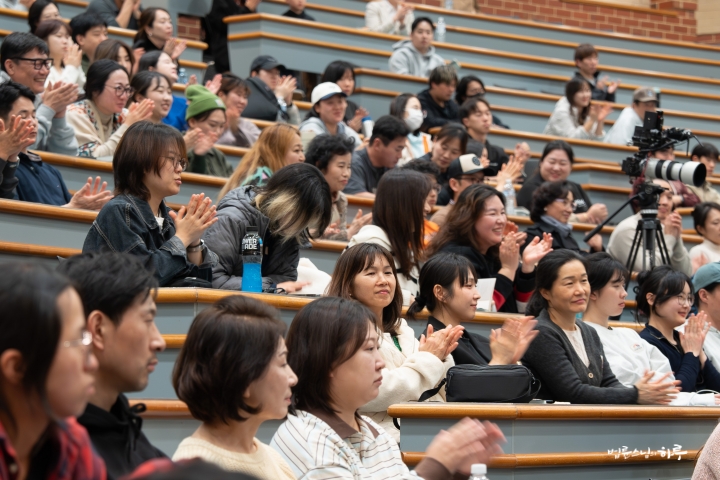
After the lecture, there was a brief book signing session. The audience lined up to receive Sunim’s signature.
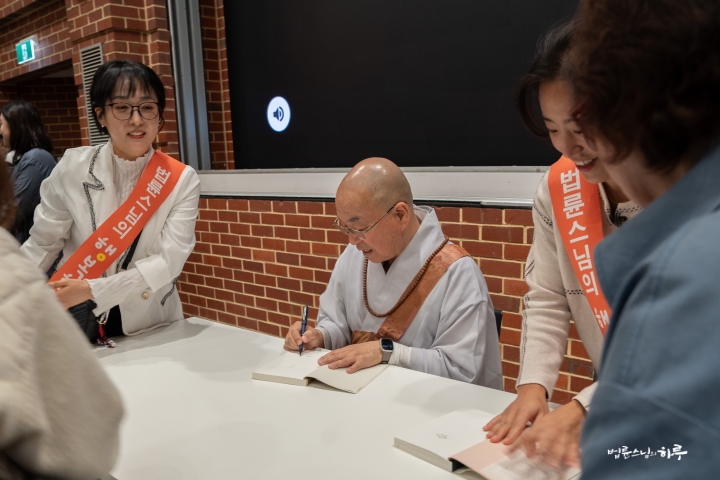
After the book signing ended, Father Dimitri, who had lent the church when Sunim first lectured in Perth in September 2017, came to greet him.
“Sunim, I’ve retired now. If JTS needs people for overseas support projects, just let me know anytime. I’ll go anytime.”
“Yes, I’ll do that. Thank you.”
Sunim signed a book as a gift for the priest and took a photo together.
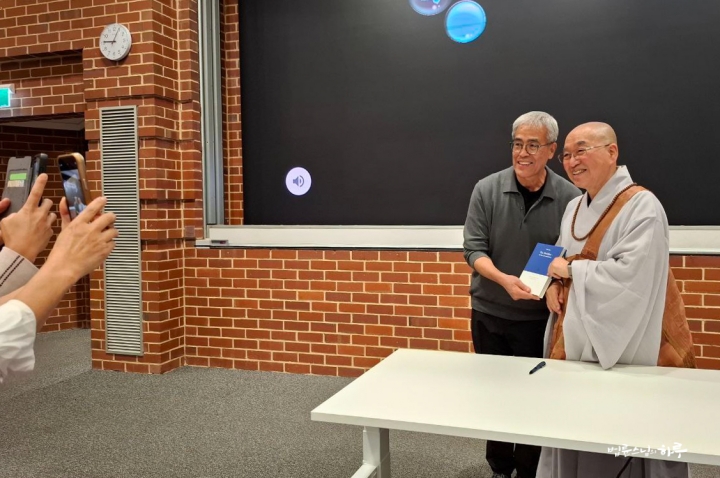
He also took a commemorative photo with the volunteers who prepared the lecture.
“Perth Jungto Society, fighting!”
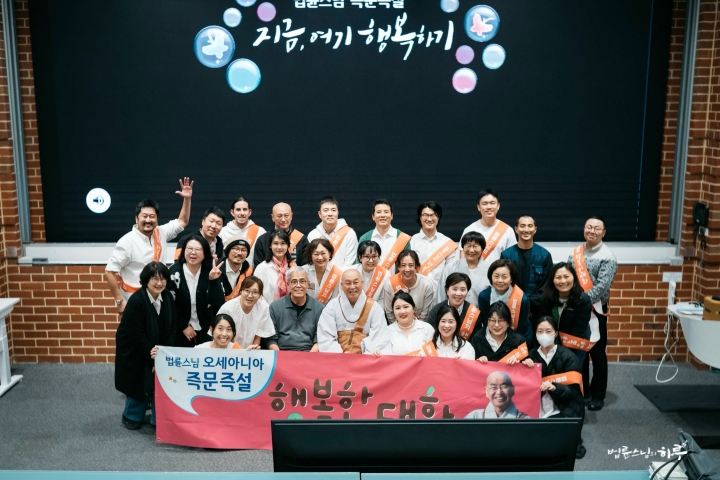
Following the volunteers’ cheer, Sunim shouted once more.
“Father, fighting!”
Amid everyone’s laughter, Sunim expressed his gratitude to the volunteers. He especially gave his books as gifts to those who coordinated the lecture and provided accommodation, expressing his thanks.
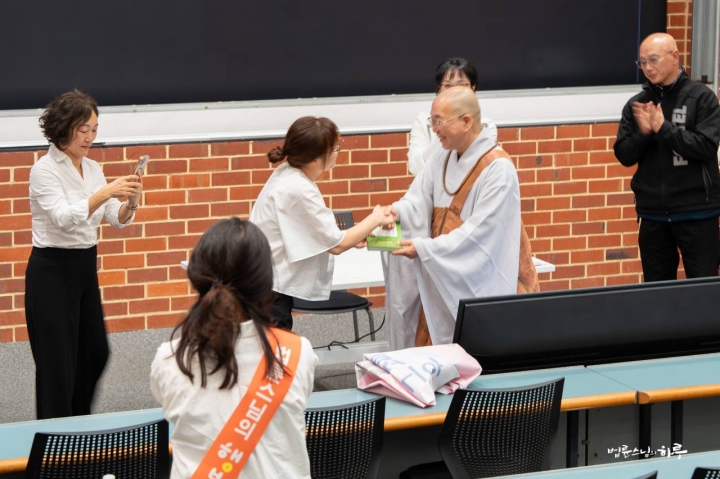
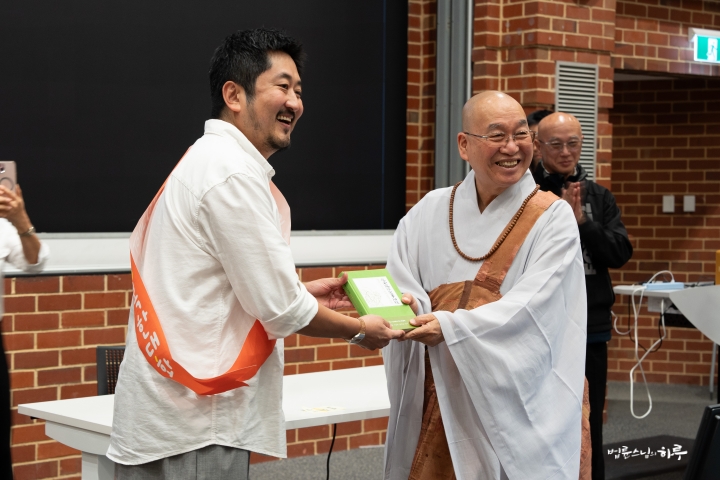
Today marked the successful completion of the lecture tour in five Oceania cities.
After briefly saying goodbye to the volunteers, Sunim immediately headed to the airport. Upon arriving at Perth Airport, he exchanged farewells with Jungto Society members who came to see him off. While it was disappointing that the Jakarta, Indonesia lecture was canceled, promising to meet again next time, Sunim boarded the flight to Korea at 12:10 AM.
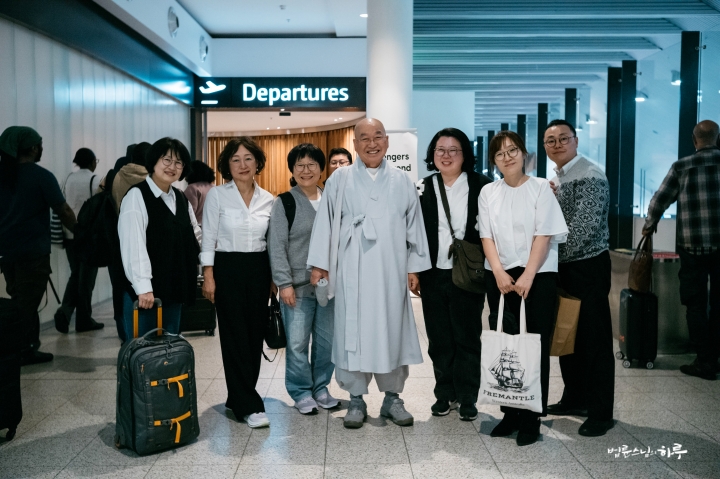
Tomorrow, after a 7-hour and 45-minute flight, he will arrive at Hong Kong Airport at 8 AM. After waiting at Hong Kong Airport all morning, he will board another flight at 2:25 PM and arrive at Incheon Airport at 7:05 PM.





